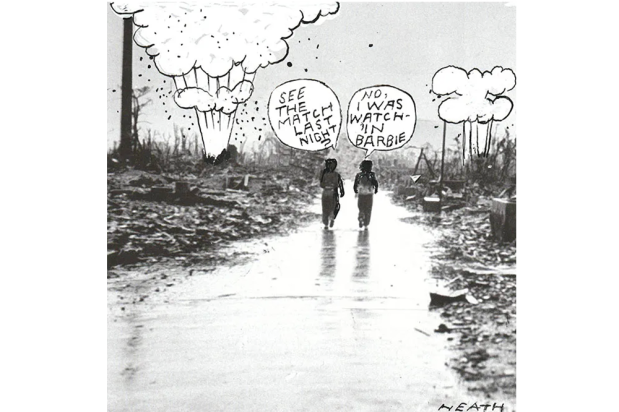Too many bishops
Sir: As a former Anglican clergyman, I have been following your articles about the current state of the Church of England with interest and sadness. I note that the recent article by the Archbishops of Canterbury and York is strong on modish phrases, such as a ‘mixed ecology church’, but it ignores two of the large elephants in the room (‘A Christian vision’, 13 February).
The number of bishops over the past century has more or less doubled, in spite of the diminishing number of worshippers and parish clergy. Likewise, while archdeacons used commonly to run their own parishes in addition to their archdiaconal duties, they are now separately housed and paid, along with an army of administrators and advisers.
While the government outrageously prohibited church services during the first lockdown, it has seen reason subsequently to permit them within social distancing rules. However, I see that most Anglican churches remain closed, or without public worship. By contrast, my local Catholic church is open for prayer and mass is offered at least once a day with social distancing in place. It has been a tremendous comfort during these times.
Richard Martin
Oxford
Higher calling?
Sir: I don’t suppose I’m alone in hoping that the Archbishop of Canterbury read the Letters page in your 13 February issue and that he takes urgent and practical action accordingly. Does he have any idea of the near-contempt in which the church’s ‘higher management’ is held? Substantial cuts and other economies at diocesan levels are clearly called for, and far greater support given to front line parish ministry.
Bryan Samain
Halesworth, Suffolk
I am no Janus
James Hawes’s magnificently eccentric review of my book This Sovereign Isle (23 January) accuses me of changing my mind about the Glorious Revolution — a subject that occupies some four lines of my text, much less than Hawes devotes to it in his. He concludes triumphantly that: ‘A historian who completely upends his view of so central an event, in such happy lockstep with a new political dispensation, owes us an account of what precisely he saw on the road to Damascus.’ A worried Spectatorreader has written confronting me with this charge, and asking if it means that I am ‘a Janus who cuts his cloth to suit his argument’. In case any other reader is anxious, may I plead not guilty? In The English and Their History (2014) I wrote that ‘Armed meetings of citizens were called in the Midlands and the North’; and in This Sovereign Isle, that ‘numerous meetings of citizens, sometimes bearing arms [were] ready to enforce the popular will’. I willingly apologise for repeating myself, but not for changing my tune.
Robert Tombs
Cambridge
Proof of immunity
Sir: Almost two thirds of the British population are in favour of immunity passports (‘Papers, please’, 13 February). It appears that common sense is more widely active than is commonly supposed. I travelled to South Africa in 1966, and one condition of being allowed to fly there was that all travellers had to be vaccinated against yellow fever and inoculated against smallpox. I do not recall any complaints about infringements on freedom, impingements on human rights, or gripes against government surveillance. We understood the need and simply complied, and the relevant certificates were folded into our passports. Perhaps during the intervening 55 years we have simply come to take too much for granted.
J. Cannon
Hornchurch, Essex
Just find a nightjar
Sir: Steve Langan (Letters, 13 February) might try discovering a local population of nightjars in his conservation village in Leicestershire. Such a population exists in my own village and, as such, conservation rules ensure that the village remains pitch black on moonless nights, as my wife and I discovered at closing time on our first evening here. As for New York and the painted street lamp, one can’t help but think that a shift from orange to grey has become a recurring theme over there.
Andrew Mitchell
Inkpen, Berkshire
Initial impressions
Sir: Further to Dot Wordsworth’s musings on courtesy titles (Mind your language, 13 February), cricketing etiquette also dictated that scorecards displayed amateurs’ initials before their surnames, while professionals followed. In the 1950 MCC vs Surrey fixture, working-class Fred Titmus was laughably classified as an amateur. This faux pas was soon rectified via the Lords public address system: ‘Ladies and gentlemen, a correction to your scorecards… for F.J. Titmus, please read Titmus, F.J.’ Eminent Victorian cricketers were often referenced by their first two initials, notably ‘W.G.’ Grace and ‘C.B.’ Fry. This also extended to the fictional Raffles, known to his chums as ‘A.J.’. The South African batting supremo A.B. de Villiers also trumpeted his initials, although his teammate V.D. Philander for some reason preferred plain Vernon.
S.J. Pittard
Huish Episcopi, Somerset
Winter of chilblains
Sir: As a 14-year-old boy during the 1962-3 winter, I held the opposite view to Charles Moore (Notes, 13 February), who remembers it as ‘an enchanted time’. My boarding school had no heating in the classrooms or dormitories, and wearing gloves for Combined Cadet Force training was forbidden. The result was chilblains on my fingers, which appeared for many years to come at the first sign of cold weather.
David Bennett
Hove, Sussex
Got something to add? Join the discussion and comment below.
Get 10 issues for just $10
Subscribe to The Spectator Australia today for the next 10 magazine issues, plus full online access, for just $10.
You might disagree with half of it, but you’ll enjoy reading all of it. Try your first month for free, then just $2 a week for the remainder of your first year.














Comments
Don't miss out
Join the conversation with other Spectator Australia readers. Subscribe to leave a comment.
SUBSCRIBEAlready a subscriber? Log in